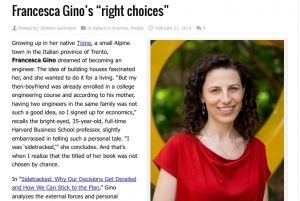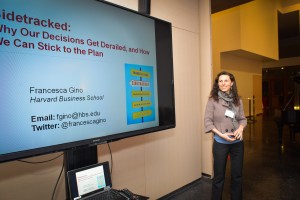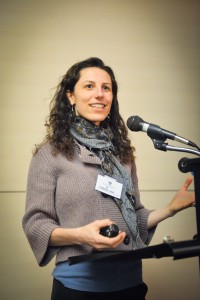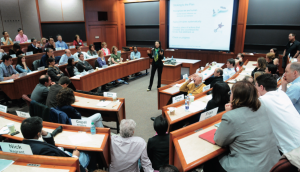 Growing up in her native Tione, a small Alpine town in the Italian province of Trento, Francesca Gino dreamed of becoming an engineer. The idea of building houses fascinated her, and she wanted to do it for a living. “But my then-boyfriend was already enrolled in a college engineering course and according to his mother, having two engineers in the same family was not such a good idea, so I signed up for economics,” recalls the bright-eyed, 35-year-old, full-time Harvard Business School professor, slightly embarrassed in telling such a personal tale. “I was ‘sidetracked,’” she concludes. And that’s when I realize that the titled of her book was not chosen by chance.
Growing up in her native Tione, a small Alpine town in the Italian province of Trento, Francesca Gino dreamed of becoming an engineer. The idea of building houses fascinated her, and she wanted to do it for a living. “But my then-boyfriend was already enrolled in a college engineering course and according to his mother, having two engineers in the same family was not such a good idea, so I signed up for economics,” recalls the bright-eyed, 35-year-old, full-time Harvard Business School professor, slightly embarrassed in telling such a personal tale. “I was ‘sidetracked,’” she concludes. And that’s when I realize that the titled of her book was not chosen by chance.
In “Sidetracked: Why Our Decisions Get Derailed and How We Can Stick to the Plan,” Gino analyzes the external forces and personal decisions that can throw us off of our intended course. As an economist who once dreamed of being an engineer, she knows that getting sidetracked isn’t always bad. In many other instances, however, careful thought and considered analysis must be put into getting our original plans back on course, as the title of her book implies.
 Francesca’s “sidetracking” decision to study economics instead of engineering led her to a collaboration with Enrico Zaninotto, head of her department at the University of Trento, which led to her the first academic publication: “Sistemi di produzione” (Productive Systems). “The process of putting that book together was so rewarding and satisfying,” she recalls with an even brighter sparkle in her wide green eyes, “that I decided to stick to the field of research.” Soon came the Ph.D. at Pisa’s prestigious Sant’Anna Institute, where an experimental “American-style” program was being offered: It included spending a year abroad as a visiting student at a connected academic institution. “I went to Harvard to spend six months, maybe a year, and I never came back.”
Francesca’s “sidetracking” decision to study economics instead of engineering led her to a collaboration with Enrico Zaninotto, head of her department at the University of Trento, which led to her the first academic publication: “Sistemi di produzione” (Productive Systems). “The process of putting that book together was so rewarding and satisfying,” she recalls with an even brighter sparkle in her wide green eyes, “that I decided to stick to the field of research.” Soon came the Ph.D. at Pisa’s prestigious Sant’Anna Institute, where an experimental “American-style” program was being offered: It included spending a year abroad as a visiting student at a connected academic institution. “I went to Harvard to spend six months, maybe a year, and I never came back.”
Ten years and several publications later, she sits in the closest thing to a corner office (all it lacks is an extra window) in the Baker Library, an austere colonial looking building in the heart of the Harvard Business School, one of the world’s most prestigious academic institutions. Books line the office walls, leaving space only for a few pictures of her husband, Greg, “a computer guy with people skills,” as she describes him (no, not the engineer from Trentino, in case you are wondering) and their one-year-old son, Alexander. Casually dressed, and utterly at ease in her workspace, she is understandably delighted with her lot in life.
 Already featured on CNN, NPR, Forbes and the New York Times, Gino’s in-depth explorations into the ways people behave, interact and decide has taken her to exciting places and situations: from motorcycle race tracks with the Ducati team to observe how they manage the transition between categories, to the operating room at Massachusetts General Hospital to monitor the interaction between surgeons, doctors and assistants during open heart surgery sessions.
Already featured on CNN, NPR, Forbes and the New York Times, Gino’s in-depth explorations into the ways people behave, interact and decide has taken her to exciting places and situations: from motorcycle race tracks with the Ducati team to observe how they manage the transition between categories, to the operating room at Massachusetts General Hospital to monitor the interaction between surgeons, doctors and assistants during open heart surgery sessions.
And she doesn’t just observe interactions as they unfold. More often than not, institutions, organizations and business are willing to make changes, even major ones, in their workflow to accommodate Gino’s “interventions” as she calls them, providing her data about the consequences these changes produce over time. “Of course, the name Harvard helps convincing them,” she explains, “but most of the time they end up not only learning, but also improving as a result of my research, so it is a win-win situation.”
Despite the relentless work, which involves full-time teaching of graduate-level courses in behavioral science, she still finds time for herself, her family (“a husband working as a freelance is a big help,” she reckons) and her relationship with her motherland of Italy. An active member of Professional Italians in Boston, she even manages to return to her native Trentino region at least once a year. ” I miss Italy,” she admits, “but this job that I have here is just too exciting.” In fact she even tried to bring the two together by attempting to launch collaborations with Italian institution, but so far to no avail. “I tried to talk to a few ministries, and institutions” she concludes half jokingly and half not “but, so far, only to find that by the time I called again, completely different people were in charge.”
 “I would like to get my country involved in my studies,” she says. “They are a powerful tool that can be used in many different ways, in many different fields — from marketing all the way to international politics.” When I play the devil’s advocate, point to the temptation to use her findings to gain an unfair advantage over people’s choices in order to make money, obtain power and what not, seems very high she cuts short. “Like every powerful tool y research can be used for good or bad purposes. All I am trying to do is helping people making the right decisions every time.”
“I would like to get my country involved in my studies,” she says. “They are a powerful tool that can be used in many different ways, in many different fields — from marketing all the way to international politics.” When I play the devil’s advocate, point to the temptation to use her findings to gain an unfair advantage over people’s choices in order to make money, obtain power and what not, seems very high she cuts short. “Like every powerful tool y research can be used for good or bad purposes. All I am trying to do is helping people making the right decisions every time.”
